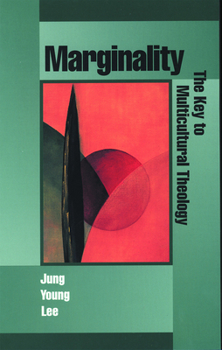Marginality
Select Format
Select Condition 
Book Overview
"To transcend or to live in-beyond does not mean to be free of the two different worlds in which one exists but to live in both of them without being bound by either of them." - Jung Young Lee In this work Jung Young Lee proposes a framework that justifies and undergirds development of contextual theologies without becoming itself dominating. Lee aims to address the dilemmas of contextual theology not by moving one or another group from the margin to the center, but by redefining marginality itself as central. Marginality, he contends, is not only the experience of being outside the dominant group or in-between groups, but also "in-beyond"-a holistic, process-oriented definition that highlights the catalytic, transformative potential of living at the creative nexus of worlds. Lee's insight into marginality leads him directly into a new model for contextual theologies that focuses not on historical experience but on creative potential. His chapters work out concretely what such a notion can mean culturally, methodologically, and doctrinally to a movement that professes to follow the very paradigm of creative marginality, Jesus Christ.
Format:Paperback
Language:English
ISBN:0800628101
ISBN13:9780800628109
Release Date:July 1995
Publisher:Fortress Press
Length:216 Pages
Weight:0.70 lbs.
Dimensions:0.5" x 5.5" x 8.4"
Customer Reviews
3 ratings
What does it mean to be a marginalized person as an immigrant?
Published by Thriftbooks.com User , 19 years ago
There have not been much materials of "Theological reflection" about being Korean-Americans. I assume that it is because of the short immigrant history in the North America. Therefore, the famous Korean American theologians I remember are handful: Sanghyun Lee is a professor at Princeton, Jung Young Lee was a professor at Drew University and passed away, and Andrew Sung Park is a professor at United Theological Seminary. Among them, Jung Young Lee's book which contains theological reflections about his marginalized life in the United States is very insightful and helpful for me who is on the same boat. Through his book, Marginality, Lee is seeking the answer to the question, "What is the meaning of life as an ethnic minority in America?" Therefore, this book is his faithful and theological reflection regarding the issue of `living' in the North America as a marginalized person. As another Korean Christian immigrant, I really enjoyed reading this book from chapter by chapter because it is like my own story and all of his issues are what I have been struggling with as a Christian leader. Through this book, most of all, I realized that I'm not alone in this struggle with existential and theological questionings. I also expanded my narrow perspective of Korean-Canadian to Asian-American/Canadian, and I affirmed that my own theologizing has been on right track: finding out creativity of marginal situation, interpreting our situation as liminality with communitas, and considering identity discovery as the first step of creative transformation. In his book, Lee takes `authobiographical method' for his theological method, saying, "Theology is certainly autobiographical, because I alone can tell my faith story ... if theology is contextual, it must certainly be at root autobiographical" (Lee 1995:7). Therefore, he uses freely several forms from his life for his doing theology such as parable, narrative, and poetry. He starts his theologizing from his context, the margin of the North America. He introduces and soon refuses the classical definition of marginality that emphasizes only the negative side of marginality such as alienation, rejection, and struggles, and so forth. According to him, this is a product of centrality, which has to be overcome ultimately. The central groups view this marginality as "In-between" paradigm. However, it has to be overcome by the new definition of marginality, which is brought from his new marginal perspective. The new one is related to `both/and' and `In-beyond' approach, but it is totally new and creative because it is very `holistic.' He explains, "Just as `in-between' and `in-both' are one `in-beyond,' the margin and creative core are inseparable in new marginality" (61). Therefore, the norm of new marginality is the harmony of difference, and through this paradigm, he can be both an American and well as an Asian. "The new marginal person can be a reconciler and a wounded healer to the two-category sys
An interesting read with some controversial conclusions
Published by Thriftbooks.com User , 19 years ago
In this book, Dr. Lee tries to write a theology based on his expereicnes of being marginalized as an Asian-AMerican in the Unites States. THis book is definately in the stream of Liberation theology and is an interested read for all people interested in how theology is formulated by those who are outside of mainstreams of power. Brutally honest in emotion, this book weaves theology and expereince together in order to create a new perspective that both understands the center of theology but also is faithful to his roots. The only problem I had is with some of his recommendations for change. In some, I did not fully understand how he came to his conclusions from what he wrote. However, even with this bit of confusion, this book is still a good book for those who are interested in liberation ethics.
Very thought provoking
Published by Thriftbooks.com User , 20 years ago
This is one of those books where, as a reader, you probably will need much time to digest what the author has presented. Unlike many theological books, Jung Young Lee's emotional passions are included, revealing to the reader the foundations of his perspective. He knows firsthand the joys and sorrows of being marginalized.






